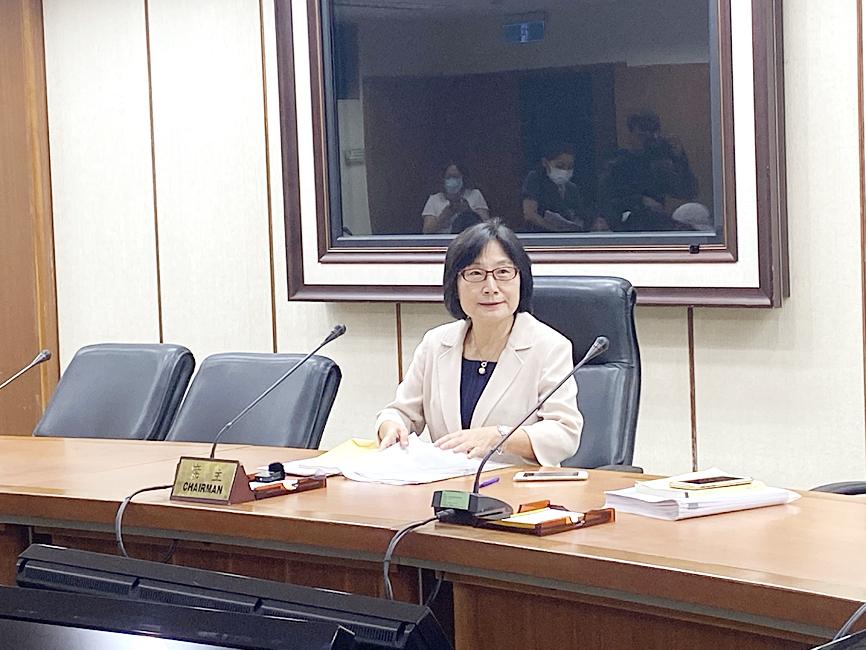The Ministry of Economic Affairs yesterday approved an application by some individual and institutional shareholders of Tatung Co (大同) to hold an extraordinary shareholders’ meeting to elect a new board of directors, a month after the ministry deemed Tatung’s June 30 shareholders’ meeting invalid and rejected registering the board directors elected at that meeting.
“We have determined that Tatung chairwoman Lin Kuo Wen-yen (林郭文艷) contravened the law, as she abused her role as the head of the board and gravely infringed on the rights of shareholders,” Department of Commerce Director-General May Lee (李鎂) told a news conference in Taipei.
Under Lin Kuo’s instructions, Tatung blocked several shareholders, who collectively hold a 53 percent stake in the company, from voting at the June 30 annual general meeting on accusations that they received funding from Chinese investors.

Photo: Huang Pei-chun, Taipei Times
Lee criticized Lin Kuo for abusing her power, saying it is not up to a company to decide whether shareholders have contravened the law, but the authorities.
Lin Kuo has contravened articles 179 and 198 of the Company Act (公司法), both of which relating to the voting rights of shareholders, while the Financial Supervisory Commission on July 14 also found Tatung to have contravened Article 39 of the Securities and Exchanges Act (證券交易法), Lee said.
As the existing board is not legally capable of calling a shareholders’ meeting, the ministry said it therefore approved the petition by some rebel shareholders to hold an extraordinary meeting by the end of November to elect a new board, she said.
Some of the rebel shareholders in a joint statement thanked the authorities for approving their petition and vowed to hold a fair and open meeting soon.
“All shareholders’ rights will be equally respected. One share, one vote,” the petition said.

SEMICONDUCTORS: The German laser and plasma generator company will expand its local services as its specialized offerings support Taiwan’s semiconductor industries Trumpf SE + Co KG, a global leader in supplying laser technology and plasma generators used in chip production, is expanding its investments in Taiwan in an effort to deeply integrate into the global semiconductor supply chain in the pursuit of growth. The company, headquartered in Ditzingen, Germany, has invested significantly in a newly inaugurated regional technical center for plasma generators in Taoyuan, its latest expansion in Taiwan after being engaged in various industries for more than 25 years. The center, the first of its kind Trumpf built outside Germany, aims to serve customers from Taiwan, Japan, Southeast Asia and South Korea,

Gasoline and diesel prices at domestic fuel stations are to fall NT$0.2 per liter this week, down for a second consecutive week, CPC Corp, Taiwan (台灣中油) and Formosa Petrochemical Corp (台塑石化) announced yesterday. Effective today, gasoline prices at CPC and Formosa stations are to drop to NT$26.4, NT$27.9 and NT$29.9 per liter for 92, 95 and 98-octane unleaded gasoline respectively, the companies said in separate statements. The price of premium diesel is to fall to NT$24.8 per liter at CPC stations and NT$24.6 at Formosa pumps, they said. The price adjustments came even as international crude oil prices rose last week, as traders

Taiwan Semiconductor Manufacturing Co (TSMC, 台積電), which supplies advanced chips to Nvidia Corp and Apple Inc, yesterday reported NT$1.046 trillion (US$33.1 billion) in revenue for last quarter, driven by constantly strong demand for artificial intelligence (AI) chips, falling in the upper end of its forecast. Based on TSMC’s financial guidance, revenue would expand about 22 percent sequentially to the range from US$32.2 billion to US$33.4 billion during the final quarter of 2024, it told investors in October last year. Last year in total, revenue jumped 31.61 percent to NT$3.81 trillion, compared with NT$2.89 trillion generated in the year before, according to

PRECEDENTED TIMES: In news that surely does not shock, AI and tech exports drove a banner for exports last year as Taiwan’s economic growth experienced a flood tide Taiwan’s exports delivered a blockbuster finish to last year with last month’s shipments rising at the second-highest pace on record as demand for artificial intelligence (AI) hardware and advanced computing remained strong, the Ministry of Finance said yesterday. Exports surged 43.4 percent from a year earlier to US$62.48 billion last month, extending growth to 26 consecutive months. Imports climbed 14.9 percent to US$43.04 billion, the second-highest monthly level historically, resulting in a trade surplus of US$19.43 billion — more than double that of the year before. Department of Statistics Director-General Beatrice Tsai (蔡美娜) described the performance as “surprisingly outstanding,” forecasting export growth